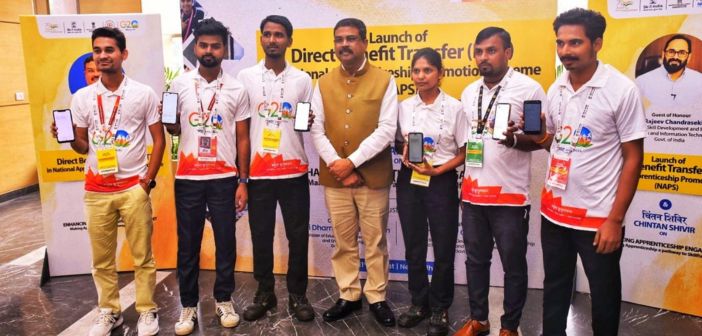To enhance engagement from industries and young individuals in nationwide apprenticeship training, Shri Dharmendra Pradhan, the Union Minister for Education and Skill Development and Entrepreneurship, has laucnhed the Direct Benefit Transfer (DBT) system within the National Apprenticeship Promotion Scheme (NAPS). The Minister launched this initiative on August 11th, 2023, with an amount of approx. 15 crores being distributed to one lakh apprentices, symbolizing the commencement of DBT in NAPS.
Since its inception in 2016 until July 31st, 2023, NAPS has engaged 25 lakh apprentices. In the current fiscal year 2023-24, around 2.6 lakh apprentices have completed their training. Active establishments have increased from 6,755 in 2018-19 to 40,655 in 2023-24, reflecting the Government of India’s dedicated efforts to enhance quality training across sectors.
Lauding the initiative, Shri Dharmendra Pradhan said that “Today is a momentous day towards invigorating the apprenticeship ecosystem in our country. Launch of DBT in NAPS is a big step towards fulfilling our Prime Minister Shri Narendra Modi’s vision of making skilling an apprenticeship aspirational and encouraging earning while learning as envisioned in National Education Policy (NEP).” He congratulated all the 1 lakh apprentices who have received stipends through DBT.
Shri Atul Kumar Tiwari, Secretary, Ministry of Skill Development & Entrepreneurship (MSDE), said that “Empowering our nation’s youth with skills is at the heart of our vision, and the introduction of DBT through NAPS marks a stride towards transparency and efficiency. A skilled workforce is paramount, and our multifaceted strategy encompasses policy evolution, industry synergies, and heightened recognition. In harmony with India’s core values of inclusivity and diversity, today’s Chintan Shivir on Apprenticeship underscores a crucial mission.” “Together, we forge ahead to craft a future where every individual’s potential finds its truest expression,” he added.

Shri Dharmendra Pradhan engaged with vibrant industry clusters and enthusiastic apprentices across Maharashtra, Telangana, Himachal Pradesh, Kerala, Haryana, and Uttar Pradesh. There has been a 488% increase in establishments that have started apprenticeship training since the commencement of NAPS. This increased adoption of apprenticeship training will strengthen India’s workforce and economy. Some of them were MCCIA, Baddi Cluster, and North Malabar Consortium Industry Cluster.
MSDE also organized the “Chintan Shivir” focusing on “Advancing Apprenticeship Engagement,” aimed at boosting the adoption of apprenticeship programs among diverse stakeholders. An essential aspect of this event is to amplify the roles and responsibilities of various entities, including central and state governments, industry bodies, and the private sector.
The “Chintan Shivir” encompassed three breakout sessions themed around:
- Stakeholder Convergences to Make Apprenticeship Aspirational
- Strategies and Practices to Promote Quality Apprenticeship
- Creating a Diverse and Inclusive Apprenticeship Ecosystem
These sessions were co-chaired by distinguished individuals such as Smt. Sonal Mishra, Joint Secretary, MSDE; Smt. Soumya Gupta, Joint Secretary, MoE MSDE; Trishaljit Sethi, Additional Secretary, Director General, DGT, MSDE; Shri Ved Mani Tiwari, CEO, NSDC, and MD, NSDC International; Shri Nilambuj Sharan, Senior Economic Adviser, MSDE; and Smt. Heena Usman, Joint Secretary, MSDE.
Key discussions revolved around:
- Promoting Dialogue on Apprenticeship
- Amplifying apprenticeship adoption
- Enhancing apprenticeship quality
- Ensuring equal opportunities for marginalized communities from diverse backgrounds and locations
With the implementation of NAPS, the Government of India reimburses 25% of the prescribed stipend — subject to a maximum of Rs. 1500/- per month per apprentice — that all employers undertake by engaging apprentices. With the implementation of NAPS, it has been noted that not all establishments seek partial reimbursement of stipend by the Government. And 30% of target apprentices under NAPS 2.0 will be paid their stipend by the Government of India. With the implementation of DBT, the number of apprentices is expected to increase. Accordingly, the percentage of apprentices covered will go up beyond 30%.
NAPS’s key achievements include:
- In FY 2023-24, approximately 2.6 lakh apprentices have accomplished successful training.
- The number of women apprentices has surged from 22,427 in 2018-19 to 1.48 lakh in FY 2022-23, registering a nearly 7-fold increase over the past five years.
- The number of active establishments has increased substantially from 6,755 in 2018-19 to 40,655 in 2023-24.
- During 2022-2023, 4.80 lakh apprentices were trained in Optional Trades, while 2.58 lakh apprentices underwent training in DT.
- Leading states like Gujarat, Maharashtra, Haryana, Uttar Pradesh, Tamil Nadu, Karnataka, and Telangana are at the top of apprenticeship engagement.
- Over 9 lakh apprentices fall within the age group of 23-26.
- Apprenticeship training attracts diverse individuals, from 5th-8th grade pass-outs to graduates, postgraduates, and certificate holders.
- The training’s impact has extended to the North Eastern Region, aspirational districts, and tribal regions.
- Awareness initiatives have been conducted nationwide, including Pradhan Mantri National Apprenticeship Melas (PMNAM), Kaushal Mahotsav, and industry cluster workshops.
- Various entities, such as Industrial Corridors, Industrial Parks, Chamber of Commerce, private sector banks, large CA firms, Sector Skills Councils, and industry clusters, actively boosted apprenticeship training.
Under NAPS, the Government of India reimburses 25% of the stipend, up to a maximum of Rs. 1500/- per month per apprentice, which employers provide while engaging apprentices. Notably, not all establishments seek partial stipend reimbursement from the Government, and the implementation of NAPS has shown that around 30% of target apprentices are expected to receive stipend payment from the Government under NAPS 2.0. With the introduction of DBT, the number of apprentices is anticipated to increase, potentially exceeding the 30% mark further.












